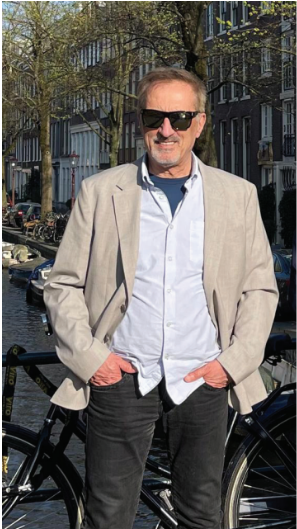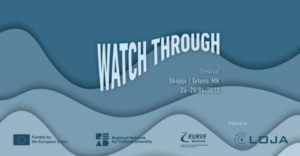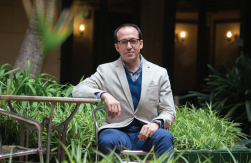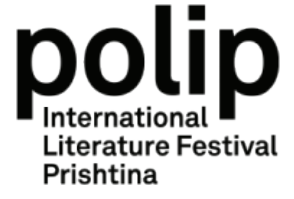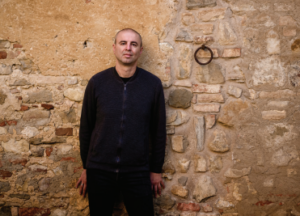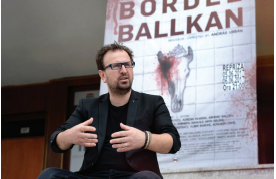Rudolf Marku is an Albanian poet, novelist, translator and essayist. He is the first Albanian poet to serve as his country’s Poet Laureate, with a two-year term commencing in
January 2021. His first volume of poetry (1973) was removed from circulation and its author banished to the countryside. Marku worked as the editor of Tirana’s only literary
newspaper, from 1987 until the end of 1990. As Drita’s editor by which he introduced many new and previously ostracized writers to the Albanian public. Currently he resides in London. Marku has published eleven books of poetry and six novels. He was the first to translate, among others, Sappho, T. S. Eliot, Ezra Pound, Konstantin Cavafy, W. H. Auden, Giuseppe
Ungaretti in the Albanian language. Both modern and classic in outlook, Marku’s work transcends specific literary eras. The writer himself believes that Sappho, Ovid and Dante are our contemporaries asmuch as T. S. Eliot, Sylvia Plath, Allen Ginsberg and other poets who are not born yet, therefore their first books are not yet published.
THE POETS
The poets gather in Hell,
Amid flaming sulphur. They chat calmly,
As if they were in their own home.
Language is an endless tunnel;
Bass consonants. Flute vowels.
But the noises of Hell drown out their conversations.
Did somebody say once they want to move the stars,
Towards Mercy, towards Compassion?
Poets are citizens of Hell,
They dip their pens in sulphur, in their own blood,
In the dreams of strangers, in ghost tales,
Punished for the sounds, the rhythm, the words,
They listen to the secret chats of the celestial spheres.
Poets are citizens of Hell.
They walk through abysses, against the gravity of love,
To reach the sinners abandoned by the language.
I WILL NEVER ARRIVE IN
TIRANA
I cross mountains, valleys, scary chasms,
I cross the seas, Mediterranean, Adriatic, Ionian,
But I do not reach Tirana, and much less Albania.
At Heathrow, Gatwick, Stansted,
They tell me I’m not going anywhere,
Neither in Eldorado nor in Hell,
And later they warn me politely, carefully,
Better to take neither planes nor trains.
Because Sadness has no geography,
Because Sadness is not a Place.
I choose other ways. By boat, ferry, submarine,
I go through secret underground tunnels of nostalgia,
I use modern tactics of memory catapults,
The latest technology of heart speed;
In Rinas they laugh at me and then they say
-You already know: you didn’t land in Tirana,
And much less in Albania, you see?
Because Sadness is not a Place,
Because Sadness has no geography.
WHY SHOULD I BE IN THIS CITY
Why should I be in this city where my heart aches?
It rains like thirty years ago over the hills,
People try to stay dry, crammed to the shop panes,
Like mannequins.
Like thirty years ago I expect you to appear
From a street corner that makes no sense –
Wet, soaked, as from your Past still keep sobbing –
In this city without any promises left.
We haven’t been to this city for thirty years
As now you’re far, Continents away,
But I come from London, and people tell me,
In this city I brought the rain!
They don’t remember It has been falling for thirty years
Raining without stopping with downbursts and storm,
Thirty years that people do not look up for the stars,
Thirty years that people are lonelier than ever before.
And why should I be in this city
Under stars with no joy, or pain?
The troubadours are dead, they are all dead
And no one remembers that tears were once called rain.
IMPOSSIBLE DIALOGUE
Now that I have reached my father’s age,
With no dis-ease or Oedipus complex
I invite him to a bar for a drink. It is late
As we stroll down the street enjoying the ladies of the night.
Who cares if they are virgins or whores,
I assure him it will all remain our secret,
Not a word to mother in the afterlife.
We tell each other everything we never said,
We gaze at the moon, bathe in the river, fish and celebrate,
Raise a hymn to death – only Death has made it possible
For me to reach my father’s age.
He has waited so long in his solitary grave,
We hasten to confide everything we never said,
I know that tomorrow he will be uneasy with me,
as before an elder,
And will want to die again.
OVID’S LAST NIGHT IN ROME
Outcast, never to return to Rome again,
I am thrown into the farthest corner of the Empire,
Where barbarians threaten on the other side of the River,
In an incomprehensible tongue. I’m away from my readers.
Writing without a reader is like dancing in the dark.
It’s the last night in Macer’s company,
Talking to Propertius about Sappho, Callimachus, Catullus,
That I confess to Virgil, Horace, and Tibullus,
That Corinna never loved me.
Did not blind Homer see the World more clearly than anyone?
I walk along the Tiber.
We are not dead as long as we are in a river’s water,
And not just on his shore!
Wise Cicero, you too died by the sword,
Far from the shore. On the Right and Left, barbarians are lining up.
The Romans calculate their profits. Endless banquets,
Inebriations and toasts to the Emperor. They have no time to read Poetry.
Senators turn a deaf ear to the Alexandrine metrics, the hexameter,
Surrounded by whores, they despise love poems,
While their wives and daughters dream poets in their beds.
Tomorrow starts the journey to the land of the Barbarians,
Now that the Barbarians begin to flock inversely, toward the Centre;
Because the Barbarians knew it for a long time:
When Rome ousts her Poets,
It’s time to hit the Empire!

